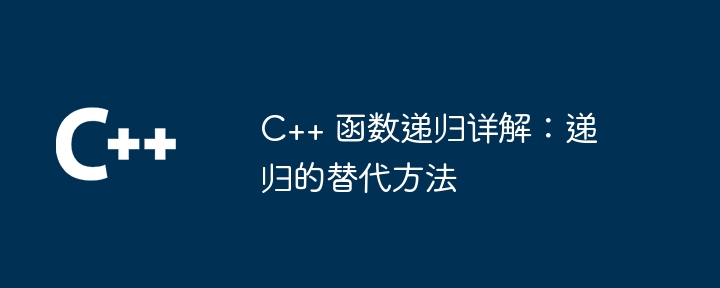
Recursion is a technique where a function calls itself, but has the disadvantages of stack overflow and inefficiency. Alternatives include: tail-recursion optimization, where the compiler optimizes recursive calls into loops; iteration, which uses loops instead of recursion; and coroutines, which allow execution to be paused and resumed, simulating recursive behavior.

Detailed explanation of C function recursion: Alternatives to recursion
What is recursion?
Recursion is a programming technique that allows a function to call itself. This can be used to solve problems where the same task needs to be performed repeatedly.
Disadvantages of Recursion
Although recursion is a powerful technique, it also has some disadvantages:
Alternatives to recursion
For efficiency and reliability reasons, the following methods can be used instead of recursion:
1. Tail recursion optimization
Tail recursion optimization (TCO) is the compiler's optimization of certain forms of recursive calls. It converts recursive calls into iterative loops, thereby eliminating stack space consumption.
2. Iteration
Iteration is an alternative way to solve recursive problems. It uses loops instead of recursive calls.
3. Coroutine
Coroutine is a lightweight thread that allows execution to be paused and resumed within a function. They can be used to simulate recursive behavior without causing stack overflow.
Practical Case
Consider the classic recursion problem of calculating Fibonacci numbers. Here is an alternative approach using iteration, tail-recursive optimization, and coroutine implementation:
Iteration:
int fib_iterative(int n) { int a = 0, b = 1, c; for (int i = 0; i < n; i++) { c = a + b; a = b; b = c; } return b; }
Tail-recursive optimization:
int fib_tail_recursive(int n, int a, int b) { if (n == 0) { return a; } return fib_tail_recursive(n - 1, b, a + b); } int fib_tail_recursive_wrapper(int n) { return fib_tail_recursive(n, 0, 1); }
Coroutines:
struct fibonacci { void operator()(int n) { std::queue q; q.push(0); q.push(1); for (int i = 0; i < n; i++) { int a = q.front(); q.pop(); int b = q.front(); q.pop(); q.push(a + b); } } }; int fib_coroutine(int n) { fibonacci fib; fib(n); return fib.get(); // 协程的返回结果 }
These alternatives provide a more efficient solution than recursion without stack overflow or inefficiency.
The above is the detailed content of C++ function recursion explained: alternatives to recursion. For more information, please follow other related articles on the PHP Chinese website!
 How to solve Java stack overflow exception
How to solve Java stack overflow exception What are the differences between c++ and c language
What are the differences between c++ and c language Recommended learning order for c++ and python
Recommended learning order for c++ and python Cost-effectiveness analysis of learning python and c++
Cost-effectiveness analysis of learning python and c++ Is c language the same as c++?
Is c language the same as c++? Which is better to learn first, c language or c++?
Which is better to learn first, c language or c++? The difference and connection between c language and c++
The difference and connection between c language and c++ C++ software Chinese change tutorial
C++ software Chinese change tutorial



